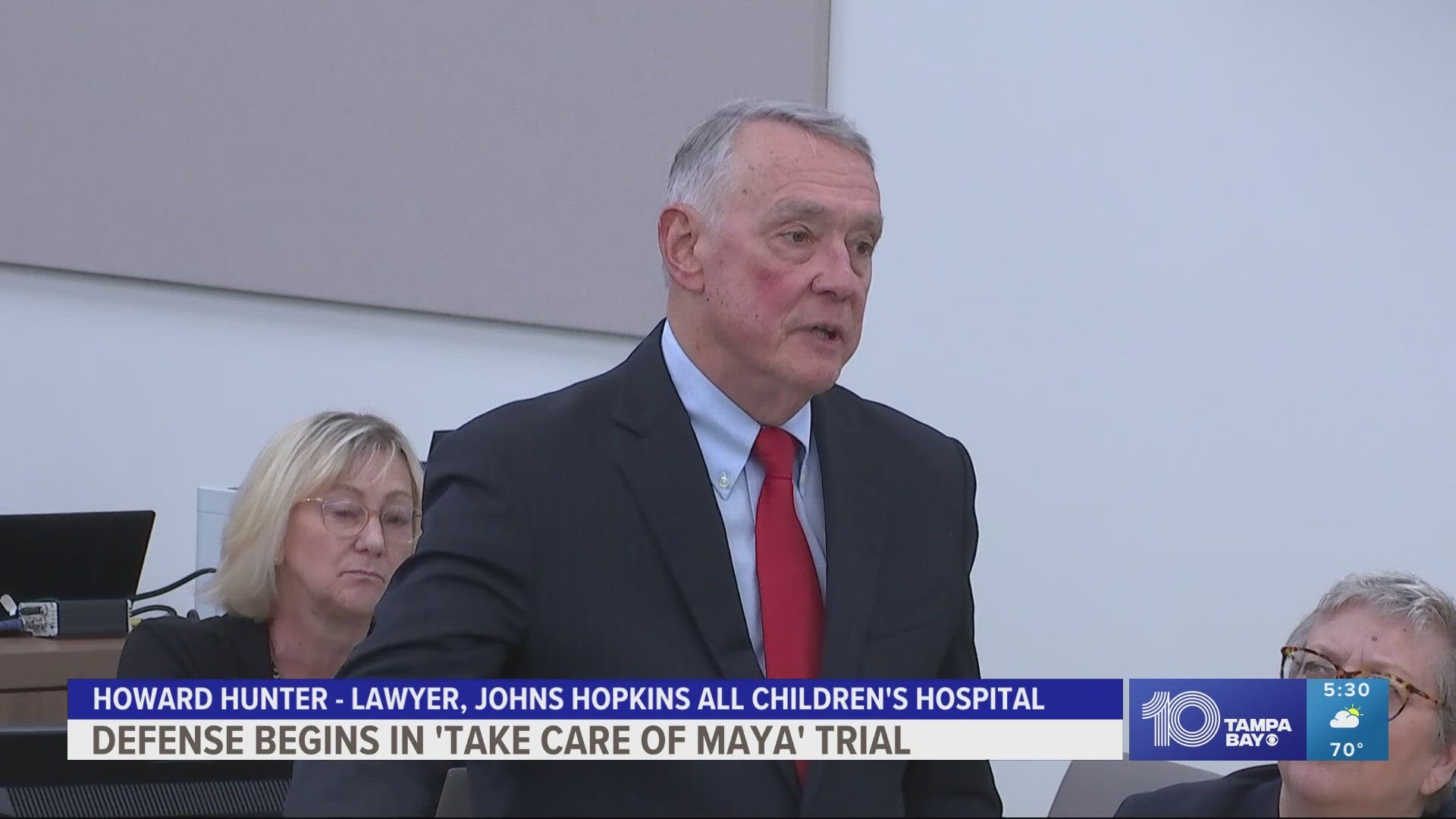VENICE, Fla. — Attorneys for the Kowalski family wrapped up their case against Johns Hopkins All Children's Hospital on Monday, giving way to the hospital's lawyers to mount their defense in the $220 million lawsuit.
Maya Kowalski's story was at the center of the Netflix documentary "Take Care of Maya." The family has accused the hospital of false imprisonment, battery, and what they called "extreme and outrageous" conduct in the way hospital staff enforced a shelter order when the state took custody of Maya in October 2016.
After weeks of emotional testimony about how the family was traumatized and left fractured forever, the hospital will now get to have its side of the story heard.
The defense team began by reiterating their position that hospital staff were following DCF orders by keeping Maya separated from her parents for 87 days. They also said they were acting in the best interest of the then 10-year-old Maya, over concerns of ketamine abuse by her mother Beata, and Munchausen Syndrome by proxy.
"The fundamental point that the plaintiff keeps coming back to is that she wanted to get her child back. She was upset that contact was being denied. Those two matters were not within the control of All Children's Hospital. That is undisputed and there is no question that was up to the court and that is the basis that this should be denied," Howard Hunter, an attorney for the hospital, said.
The judge, however, allowed the testimony from Dr. Scott Richards who spoke on events he said collectively contributed to Maya's mother Beata's suicide.
"She was not able to touch her child, see her child, she had limitations on her ability to control her world, and when we lose control of our life, we cling to some of our defense mechanisms to get some kind of control back," Dr. Richards said.
Richards said Beata's actions amounted to an altruistic surrender.
"It got to the point where she suddenly had an impulsive behavior," he added. "We have altruism where we do things for others without wanting something back but altruistic surrender is a different entity. It is where you do something for others without any thought to yourself and in fact, discount any harm to yourself."
The defense was then given the floor to present a deposition from the late clinical neuro-psychologist Dr. James Lewis who conducted an assessment on Maya at the hospital on several occasions on behalf of the DCF.
"I was not the first person to tell somebody that there was a dramatic link between this child's psychological pain and the triggering of this child's intense physical pain," Lewis said.
He said Maya disclosed other underlying issues to her mom Beata's behavior.
"She said her mother was abused by her father in Poland, so she was very specific about her mother's abuse by her father and it was causing Maya a lot of distress and she attempted to talk to her dad about how much he knew about it," Lewis added.
In the 2019 recording, Lewis further explained how the Munchausen by proxy conclusion came about.
"The presence of mental disorder, mental distress, emotional disorder, psychological disorders in a child, and parent contribute to the diagnosis of Munchausen by proxy," he said.
Lewis said that there is usually a medical condition that is exaggerated or a psychological condition in the parent that was not taken into account that causes the parent to either wittingly or unwittingly act this out for the care of the child. He also said Maya's exposure to distressing information about her treatment, for example, the danger of the ketamine coma including a 50% chance of death and the cost of the treatment to the parents, also caused the child stress.
"She believed that the trigger was the hospital homebound program that the child was denied services. Those several lines describing 'mom was upset that the kid was denied services, and she was upset that then that triggered the child having a pain disturbance which she didn't recognize' likely is that it wasn't the fact of the kid's service being denied. It was mom telling the kid and the mom being upset about this being denied and telling the kid that 'you have been denied this program' and then the kid has a major flareup of pain," he said.
Dr. Lewis also said Maya was scared of getting her mom upset and never asked about seeing her again during the time he conducted his assessment.
The defense plans to call witnesses to the stand on Tuesday and to go over several motions on what more evidence can come into court on Wednesday
Lead defense counsel Howard Hunter said during opening statements that their evidence will show that the "doctors, nurses and hospital staff acted reasonably and prudently to treat a difficult and challenging case they were presented with and did it consistently over three months. They don't have to be right. They only have to be reasonable under the law. They probably were right but even if they weren't, they were more than reasonable."

